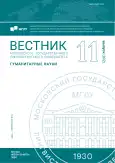THE COGNITIVE ASPECT OF THE LEXICAL CATEGORIZATION OF CHINESE DRESSING VERBS (USING THE EXAMPLE OF THE NUCLEAR VERBS 穿 AND 戴)
- Authors: Krasikova E.A.1, Shahaeva A.A.1
-
Affiliations:
- Moscow State Linguistic University
- Issue: No 11(892) (2024)
- Pages: 46-52
- Section: Linguistics
- URL: https://journal-vniispk.ru/2542-2197/article/view/291957
- ID: 291957
Cite item
Abstract
The purpose of this study is to consider the association of lexemes into certain groups as a manifestation of the categorization process reflecting the structuring of experience and knowledge by native speakers of a particular language. The methodological basis of the research was the works of E. S. Kubryakova on the cognitive characteristics of action verbs and E. G. Belyaevskaya on the conceptual internal form. The research material was the Chinese verbs 穿 and 戴. Based on lexicographic and corpora data, the article identifies those knowledge structures that stand behind the central lexical units representing the action of ‘dressing’ in the Chinese language, thereby revealing the specifics of categorization of events in the surrounding world by native Chinese speakers.
About the authors
Elizaveta Alexandrovna Krasikova
Moscow State Linguistic University
Author for correspondence.
Email: krasikova.liza@mail.ru
PhD (Philology), Associate Professor at the Department of Training Teachers of Rare Languages Moscow State Linguistic University
Russian FederationAlexandra Albertovna Shahaeva
Moscow State Linguistic University
Email: shakhaevaal@gmail.com
PhD (Philology), Head of the Department of Training Teachers of Rare Languages Moscow State Linguistic University
Russian FederationReferences
- Shahaeva, A. A. (2021). Cognitive basis of polysemy of the polysemy of the chinese classifier 上. In Sinologiya v XXI veke (vol. 1(1), pp. 134–138): Proceedings of the International Scientific Conference. Ulan-Ude, 2021, October 12. Ulan-Ude: Buryatskij gosudarstvennyj universitet imeni Dorzhi Banzarova. (In Russ.)
- Krasikova, E. A. (2024). Cognitive bases of classification of verbs of speech activity in the Chinese language. Vestnik of Moscow State Linguistic University, Humanities, 4(885), 59–65. (In Russ.)
- Shahaeva, A. A. (2024а). A cognitive approach to the linguodidactics of the Chinese language. Cognitive studies of language, 1(57), 419–422. (In Russ.)
- Gorozhanov, A. I. (2023). Rasshirenie standartnogo sbalansirovannogo lingvisticheskogo korpusa, postroennogo po pravilam spaCy, konnotativnymi harakteristikami. Philology. Theory&Practice, 16(11), 3888–3893. 10.30853/ phil20230594. (In Russ.)
- Gorozhanov, A. I., Krasikova, E. A. (2024). Poluchenie znachimyh dannyh iz nepodgotovlennogo teksta putem ego avtomaticheskoj obrabotki avtorskimi lingvisticheskimi instrumentami (na materiale elektronnyh kitajskih SMI). Issues of applied linguistics, 54, 115–138. 10.25076/vpl.54.05. EDN GGUQXL. (In Russ.)
- Gorozhanov, A. I. (2024). Algoritmy poiska frazeologizmov v lingvisticheskom korpuse s morfologicheskoj razmetkoj (indoevropejskie yazyki). Philology. Theory&Practice, 17(1), 132–138. 10.30853/phil20240020. EDN JTWSIQ. (In Russ.)
- Jin, Tao. (2007). Konceptual'naya sistema prostranstva (fragment kitajskoj yazykovoj kartiny mira) = The conceptual system of space (a fragment of the Chinese language picture of the world): monograph. Vladivostok: Izdatel'stvo VGUES. (In Russ.)
- Belyaevskaya, E. G. (2007). Cultural information in the semantics of lexical units. Issues of cognitive linguistics, 4(013), 44–50. (In Russ.)
- Shakhaeva, A. A. (2024b). Logogram structure as an important principle for modeling the polysemy of a Chinese word. Philological Sciences Bulletin, 4(1), 217–222. (In Russ.)
- Kubryakova, E. S. (1992). Glagoly` dejstviya cherez ix kognitivny`e xarakteristiki. Action verbs through their cognitive characteristics (pp. 84–90). Logicheskij analiz yazy`ka. Modeli dejstviya. Institute of Linguistics RAS. Moscow: Nauka. (In Russ.)
- Bondarchuk, G. G. (2018). The compatibility of English subject vocabulary: the cognitive aspect. Vestnik of Moscow State Linguistic University, Humanities, 9(801), 40–47. (In Russ.)
Supplementary files










